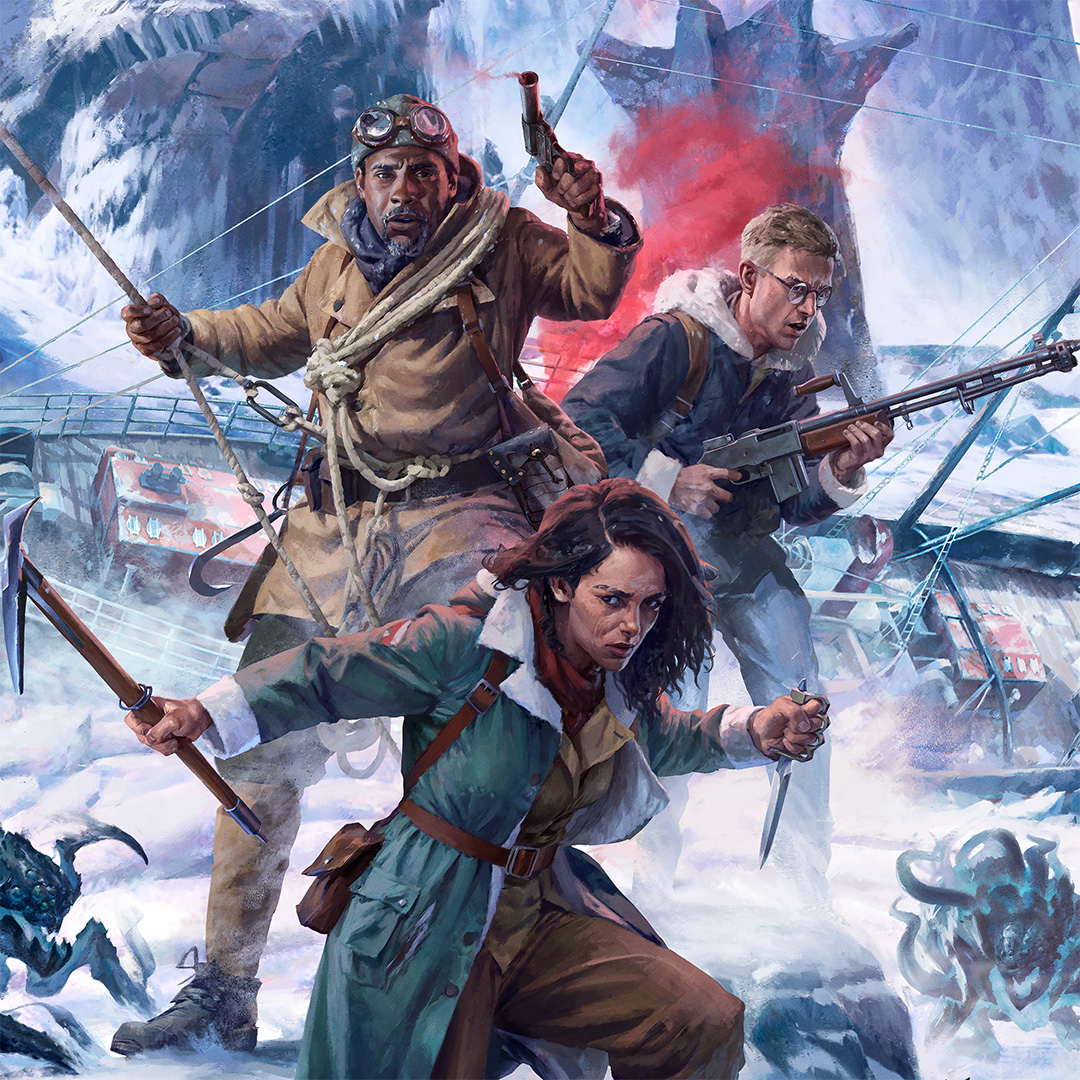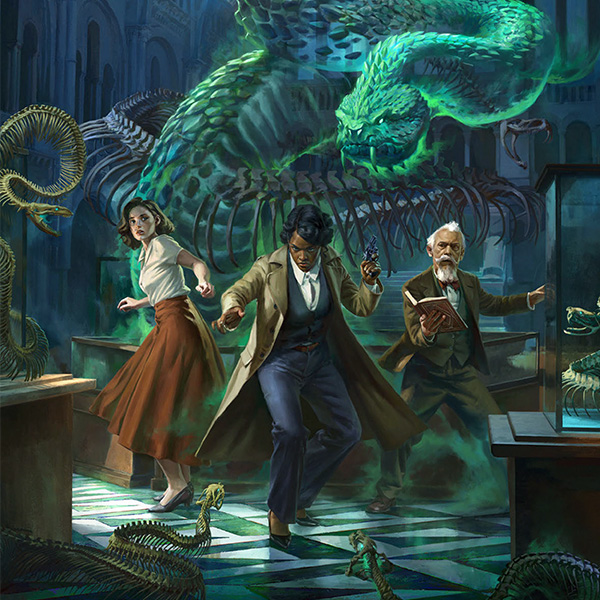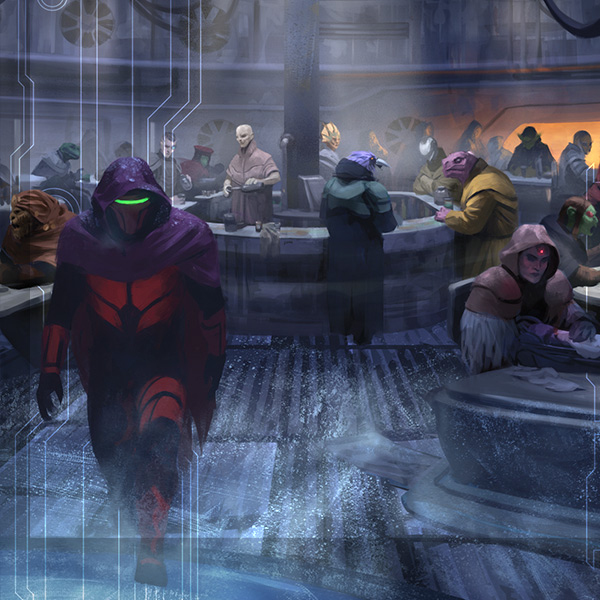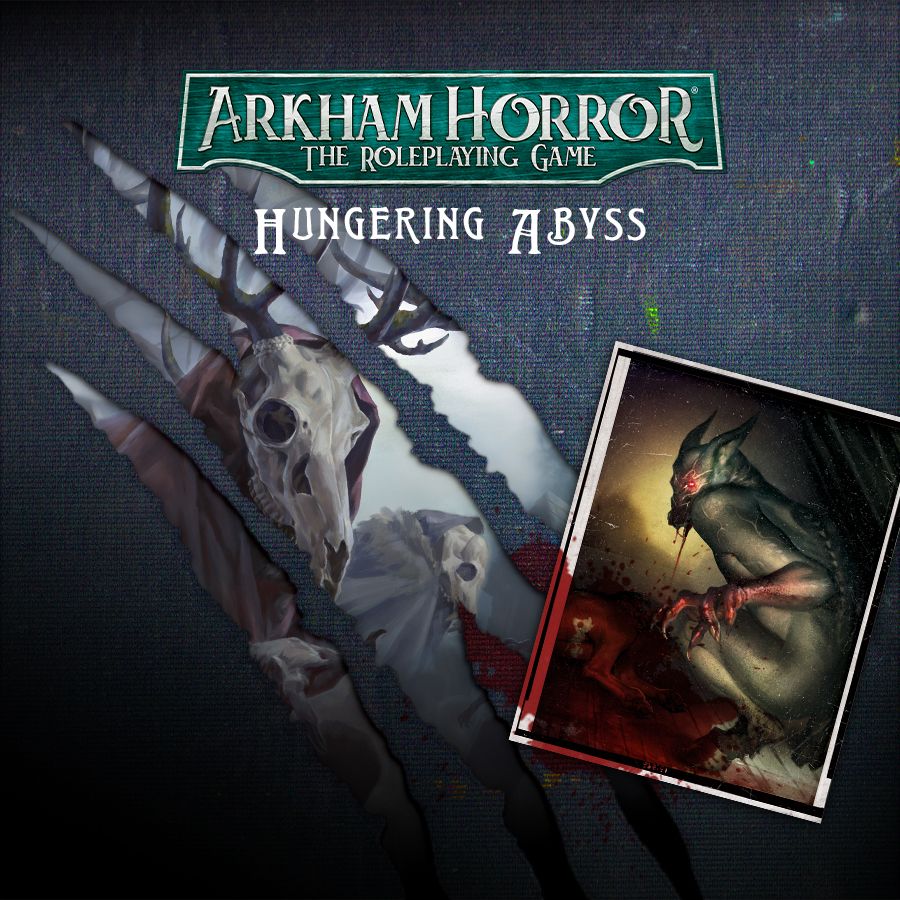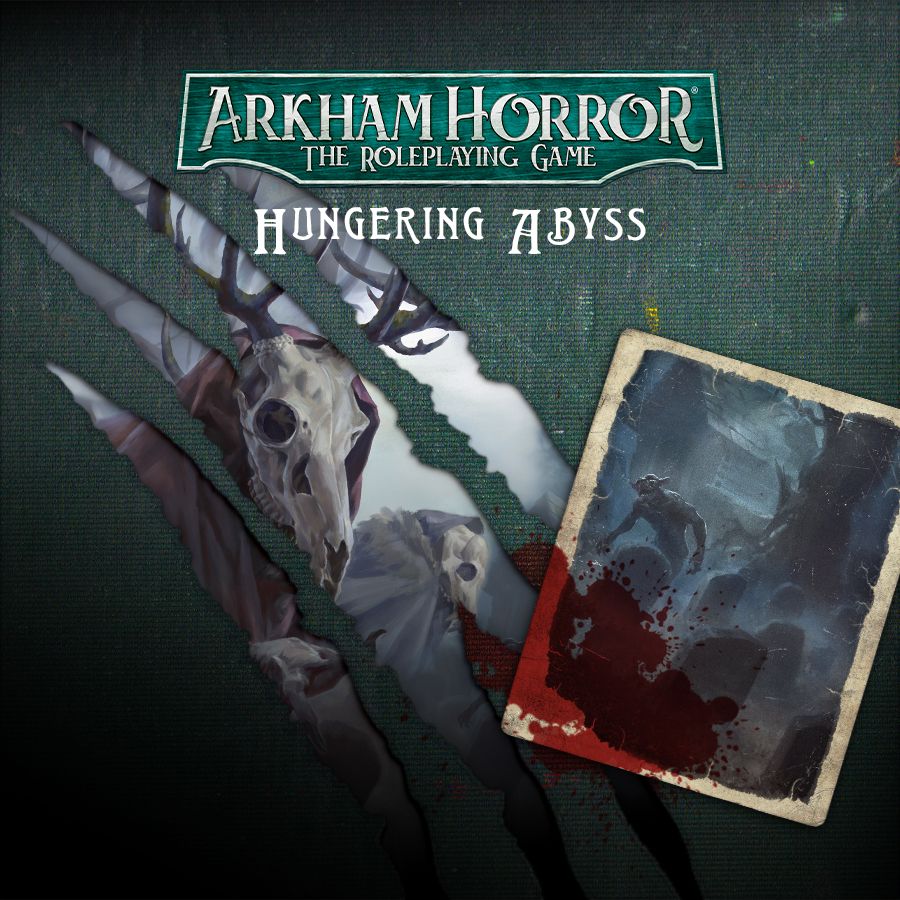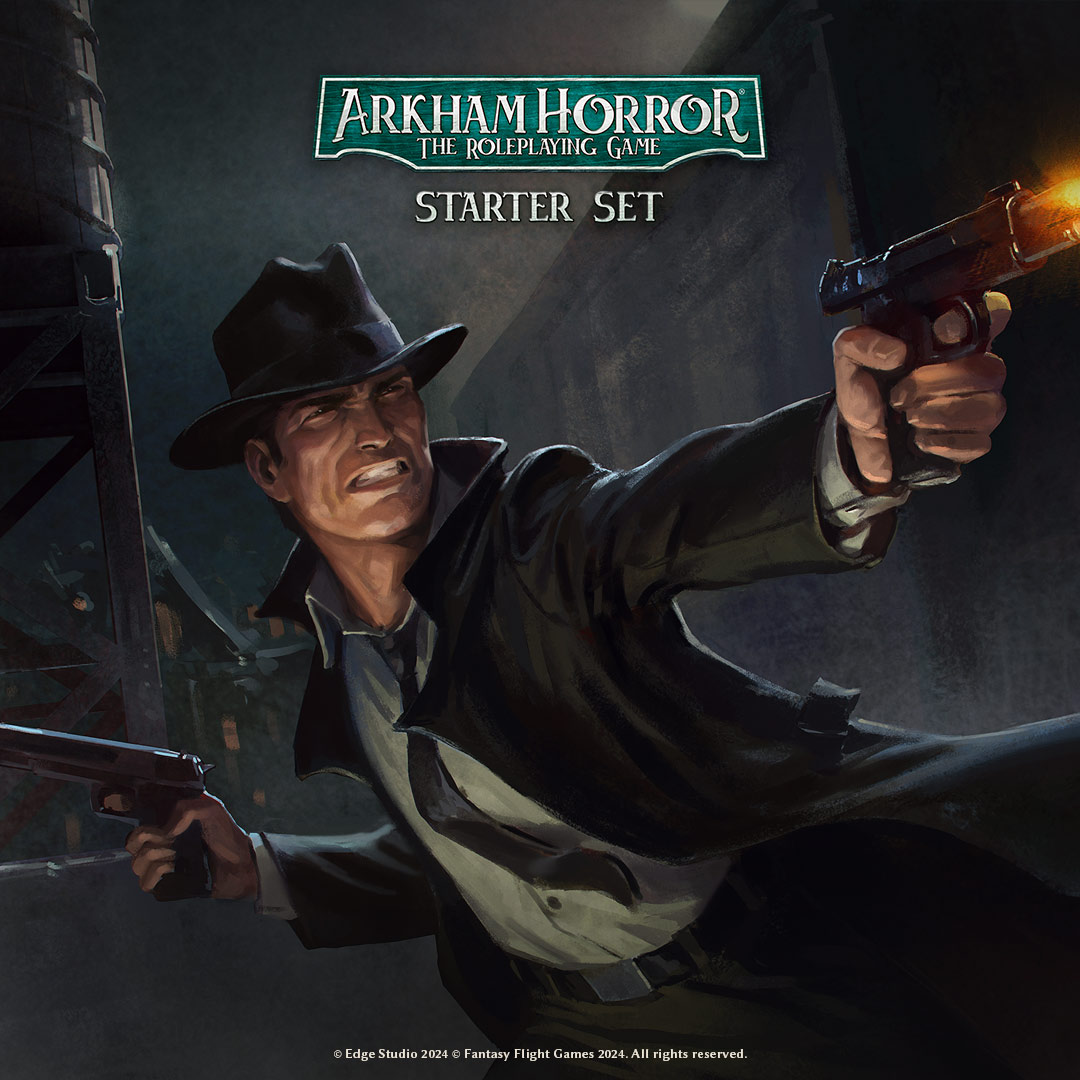Grave Rumors – Part Two
2024 / 07 / 29
By SA Sidor & AP Klosky
Welcome back! For those of you who enjoyed Grave Rumors Part One: The Vanished, we’re excited to present the second installment of this brand-new series of short stories.
As a reminder, Grave Rumors follows the adventures of witty Arkham Advertiser reporter Minnie Klein as she investigates missing corpses, vandalized graveyards, and a skin-crawling stalker disturbing the rest of Arkham’s dead… Events which lead directly into the highly anticipated Arkham Horror RPG: The Hungering Abyss. But don’t worry, it’s all completely spoiler-free.
And, you’ll find thrilling new newspaper stories and artifacts available as downloadable player handouts, allowing you to bring the story straight into your game.
Are you prepared to join Minnie on her grisly investigation? If so, read on…

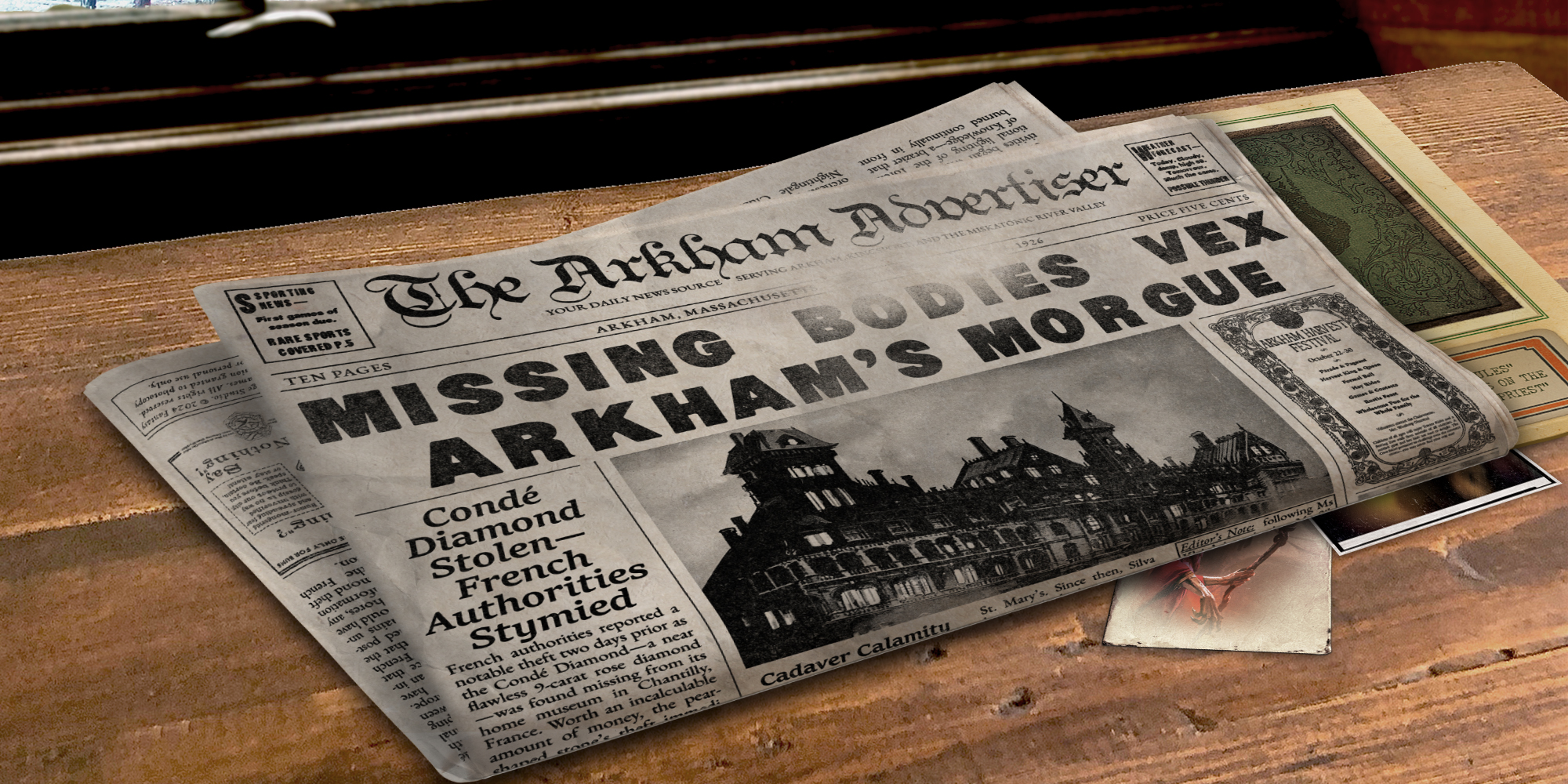
Missing Bodies Vex Arkham’s Morgue
Arkham Advertiser, 1926
As Arkham police continue to investigate disappearances across our city, a wholly different institution finds itself facing an eerily similar problem. Over the course of the past weeks, a truly disturbing number of corpses have vanished from the morgue at St. Mary’s Hospital, raising all manner of questions, with few answers provided by hospital administrators.
The Arkham Advertiser first became aware of missing cadavers following an anonymous tip, directing this reporter to one Mr. Harold Silva, a long time Arkham resident whose wife, Mabel, died of natural causes earlier this summer. Before Mabel Silva’s burial, Mr. Silva says he was contacted by someone claiming to be a member of staff at St. Mary’s Hospital, asking Harold’s permission for a full autopsy of Mabel’s corpse. Eager for a clearer indication on his wife’s cause of death, Mr. Silva agreed to the examination. However, after nearly two weeks, Silva had yet to hear any word back from St. Mary’s. Since then, Silva has inquired thirteen times regarding the autopsy results and the whereabouts of his wife’s body—nine phone calls, two letters, and two in-person visits to the hospital’s administration wing. In all cases, his attempts at communication were rebuffed: phone calls were either transferred between departments before Silva was simply hung up on, his letters ignored without reply, and his in-person visits resulted in his removal from the grounds by St. Mary’s hospital security.
Mr. Silva’s complaint was heard more readily by Arkham’s police, but given that he had provided his verbal consent for the examination, little could be done for him from a legal standpoint. While Police Deputy Dingby did request a search warrant for St. Mary’s morgue, that request was denied by Judge Neville Bradford, who noted, “While morbid, no true crime could be investigated or prosecuted, given that Mr. Silva has provided his consent for the post-mortem examination.” When this reporter attempted to contact Judge Bradford regarding this ruling, no response was provided.
Editor’s Note: following Ms Klein’s investigation, Mr. Silva has been institutionalized at Arkham Asylum, following a grief-driven hysterical episode. While we trust Ms. Klein’s investigative acumen, it is the Advertiser’s opinion that Mr. Silva’s claims are spurious at best and should be viewed with skepticism.
Even as Mr. Silva’s hunt for his missing wife continues, additional investigation revealed that Mabel Silva’s body may not have been the only one missing. During our interview, Mr. Silva provided details of another individual in similar circumstances: Mrs. Margaret Findlay, of Dunwich, who had reached out to Silva regarding her son, Aiden. Mrs. Findlay had requested a medical examination following her son’s death—Aiden had been admitted to the hospital following a serious, ongoing respiratory infection, but died during a routine procedure. However, Mrs. Findlay claims that Aiden’s body was released to neither herself nor their chosen funeral director. To date, hospital administration maintained that Aiden’s body was turned over appropriately and buried, though any attempts to have Aiden’s body exhumed have been rebuffed in no uncertain terms.
After conferring with an additional source (name withheld for anonymity), this reporter finds it credible that at least a dozen corpses have gone missing from St. Mary’s Hospital morgue over the course of this year, with little recourse made to grieving families or anyone else with knowledge of the deceased. Why would one steal a corpse, particularly with identities so disparate and unrelated to one another? How many more are missing?
Armed with this knowledge, the Advertiser contacted St. Mary’s administration staff, though after several hours of being rebuffed, this reporter elected to change tactics. We instead tracked down Hospital Mortician Ruth Turner, whom this reporter found in mid-examination of a John Doe whose body had recently been recovered during a dredging operation in the River Docks. While this reporter did her best to remain cordial and professional, Ms. Turner’s behavior caused this reporter to leave rather than risk an escalating confrontation. In the scant conversation this reporter held with Ms. Turner, the mortician did claim that she had no knowledge of any missing corpses, nor would she be able to answer any further questions.
While this reporter has yet to uncover further information on these missing cadavers, the Arkham Advertiser remains a steadfast ally to all those affected.
If readers have any information on these missing corpses, please contact both the Advertiser and the Arkham Police. If one of your own family or someone in your social circles has gone missing, please do not hesitate to reach out, as your ongoing lead may bring this macabre corpse collector to justice.
Editor’s Note: the Arkham Advertiser has received letters of complaint from Ms. Turner, regarding the actions and questions on the part of our reporter. While we trust in Ms. Klein’s professionalism, we also take the allegations from Ms. Turner seriously and will conduct our own investigation into the incident between the two women and will take appropriate action upon our findings.

Grave Rumors Part Two: The Bodies
After the unsettling events at the graveyard, Minnie didn’t go straight home. She’d yelled for what seemed like forever before Yorick found her in the grave. He helped her climb from the hole but then insisted on taking her to the hospital to get checked out. She made the mistake of briefly mentioning the masked figure who’d scared her, and he concluded she must’ve hit her head again. At the hospital, the doctor patched her up, giving her a warning to take it easy – she might have a slight concussion. Yorick drove her back to her car in his old truck, and that was that.
Despite taking a serious knock on the head, and the exhaustion she was feeling, Minnie knew that she’d never get to sleep. Her mind was racing. So, she decided to put her restlessness to good use and drive to the Arkham Advertiser offices. Buster, the nightwatchman, was accustomed to newspeople showing up at all hours. Subsequent to putting away a few speakeasy refreshments, reporters were known to wander back to the Advertiser rather than going home. If she was unsteady on her feet following her anomalous encounter with the graverobbing houndlike beings and the enrobed figure in the animal skull mask, he might not notice. She was hoping he’d simply unlock the door and let her in. No small talk or questions required. Just another night in Arkham, he’d think.
Parked under a streetlamp in her Ford Model T Runabout, Minnie did her best to wipe the soil stains from her skirt and stomp off the clods of mud caked to the bottoms of her shoes. Her plan was to stick to the shadows and breeze right past Buster. She didn’t want to have to explain why her clothes were dirty and why she had a small bandage of tape and gauze stuck on her forehead. More than likely, he’d have his face buried in the pages of a pulp magazine. She didn’t know much about him, but she knew he liked to read horror stories. He was a curious guy who wore oversized Harold Lloyd glasses that gave him an owlish appearance as he perched silently behind his desk in the lobby.
Minnie started walking.
Luckily, the pair of falls she’d taken at the graveyard hadn’t injured her too badly. The average person probably never had the misfortune of plunging into an open grave but doing it twice in one night must be a record. Minnie had earned herself a few new bruises and a small cut below her hairline – and she was currently in the clutches of a vicious, monster-sized headache – but other than that, she felt just peachy. Sure, her nerves were frayed – she’d met up with unnatural creatures that weren’t supposed to exist in the real world. Just thinking about it made her shake all over. Stumbling on the sidewalk, her legs faltered before she grabbed the brick wall of the Advertiser building for support. Dizziness swept over her like a wave of swirling stars.
“Pull yourself together, Minnie,” she said. “Make it upstairs, then you can fall apart.”
She brushed a few strands of dark brown hair to conceal the wound on her head. Crossing the final yards to the main door, she took in the dark façade of the building, which always had a few windows lit, because the news never sleeps. Back in the warehouse the typesetters and press operators would be hard at work. Approaching the entrance, Minnie could smell the odor of ink wafting from inside. She peeked through the window and spied Buster sitting there in his navy-blue uniform, hunched over a copy of Weird Tales, with a cup of coffee resting at his elbow. I’d love some hot coffee, she thought. Mustering a smile, she rapped her knuckles against the glass.
Buster looked up and smiled back. He used to work in the mornings and still did from time to time. He sprang from his chair, unlocked the door, tipping his cap as she entered. “Good evening, or should I say, ‘Good morning?’” Then he added, “Out for a stroll?”
Minnie was in no mood for idle chit-chat, but she didn’t want to seem rude.
“Too much work and not enough hours in the day,” she said. “I’m playing catch-up.”
“That’s why I prefer the late shift.” Buster said. “Things are quieter at night.”
Oh buddy, you’re wrong about that, she thought. “Thanks for letting me in,” she said, heading straight for the elevator. Buster returned to whatever horror story he’d been reading.
Minnie pressed the button and waited for her ride upstairs. Through the soles of her feet, she could feel the vibration of the printing presses, busy cranking out the morning edition.
Suddenly, Buster called out, “Hey there! Now, hold on a minute…”
Minnie jumped, her muscles as tense as a cat’s. Although she had no reason to be worried about Buster, she couldn’t help but feel jittery from everything she’d been through so far tonight. He’d gotten up from his seat again, this time with his flashlight, and was shining it at the floor. “What have we got here? A mystery, I’d say.” He bent over, studying the marble tiles and clicking his tongue.
Peering into the oval of light, she saw the trail of graveyard soil she’d left in her wake.
“Looks like you stepped in something,” Buster said, as he toed the dirt crumbles.
“More than you know,” Minnie muttered under her breath.
He stared at her; his glasses were like silver mirrors. He cocked his head. “Huh?”
“I said, ‘Oh, no.’” The elevator carriage had arrived. She opened the cage. “Sorry for making a mess. Digging up stories in this town is a dirty business. It can’t be helped.”
Buster continued to eye her quizzically as if he wasn’t sure he’d understood.
She gave him a tiny wave as the elevator hoisted her out of sight.

Minnie breathed a sigh of relief. The newsroom was empty. She didn’t want any distractions, because she had more than enough to keep herself occupied, reviewing her notes. She tossed her purse on her desk and pulled out the top drawer of her file cabinet. From the other side of the newsroom came a grumble, then a snore. One of the sportswriters must be sleeping off the side effects of his visit to a gin mill. A luxury Minnie could hardly afford. She went back to work.
Recently, she’d been reporting on a series of stories involving missing corpses – and missing persons who were very much alive at the time of their disappearances. Her editors weren’t convinced all the stories were related. But Minnie thought differently. Her adventure at the graveyard only cemented the idea that her hunch had been correct. If only she could fit the pieces together, then she’d know the big picture, and she’d share it with the Advertiser’s readers.
Minnie began with something William Yorick had said to her about the papers stolen from the groundskeeper’s shed: the body transfers. He mentioned there were problems with the paperwork before the theft, and that all the trouble came from St Mary’s Hospital. What Yorick didn’t know was that Minnie had visited the St Mary’s morgue a couple weeks ago and talked to one of the morticians. She was sure she recognized the name Yorick had given her, but she wanted to confirm it. Now, where was that file?
Minnie had her own notetaking system. No one else could make heads or tails of what she wrote down, and there were times when she struggled to decipher her own scribblings. But the method worked for her, and she always transcribed her interviews before writing up a story.
Flipping through her records, she located a file labeled: SMH – Morgue Int.
Inside the folder, she found the transcript she’d made of her interview. The interviewee’s name was typed at the top of the page.
Ruth Turner, mortician
It was the same name Yorick told her. Maybe these facts were finally leading somewhere. Minnie rolled her swivel office chair into position and sat down, kicking off her muddy heels and crossing her ankles on top of her battle-scarred desk. Her legs were killing her. She massaged her sore muscles with one hand and with the other leafed through the transcript pages in her lap.
Yes, she remembered Ruth Turner. Long black hair pulled away from her face and pinned back – she was all business, with a brusque manner that bordered on dismissiveness. Turner had been ducking her for days, calling off their appointments, making excuses, or not being on duty at the morgue when Minnie showed up. The mortician claimed she had no time to talk and that there wasn’t anything to discuss, anyway. Minnie had finally decided to stake out the main lobby of the hospital, hoping to catch her unannounced. She paid off an orderly to point out Turner when she arrived for her shift, then she slipped him another ace from her wallet to give her directions to the morgue and help her sneak past the nurse’s station into the stairwell that led down to the basement level. Fittingly, the morgue was located underground.
The tomblike basement’s tiled floor was a nauseating shade of green, the same color Minnie felt her skin must be turning as she entered a hallway and rounded a corner. She passed several doors without trying them. Did they keep the temperature freezing down here, or was it naturally this cold? A harsh tang of disinfectant burned her nostrils and throat, but even that couldn’t mask the aroma of death hidden behind closed doors. The question was: Which door?
Minnie got lucky – or unlucky, depending on how you looked at it. The first door she tested was unlocked, and immediately to her left she spotted a second door. She pushed through it into a long room where the antiseptic smell grew stronger: the autopsy area. In the middle of the room stood a steel pedestal table with an examination light that came out of the wall on an adjustable arm. A rolling tray filled with gleaming dissection instruments sat next to the table.
Minnie looked away.
At the far end of the room there was a metal sink and cabinets. A spigot near the floor had an attached hose. The hose lay uncoiled, as if it had been dropped in haste, its sprayer resting in a puddle, where the water was running audibly – a wet, throaty gargle – into a perforated floor drain below the exam table. She told herself that the stains around the drain cover must be rust. But she knew they weren’t. Minnie swallowed the sour taste filling her mouth and soldiered on, happy that there was nobody being prepped on the table but disappointed that the mortician was absent too. Where did she go? If Minnie didn’t find her this time–
“Excuse me! What are you doing here? This is a restricted area!”
That was how she met Ruth Turner for the first time. The woman came striding out of what appeared to be an office. She was wearing a clean medical gown and carrying a sheaf of papers. Minnie didn’t recall the exact words that came next. But Turner was livid, only backing off once Minnie identified herself. That changed everything. The color fled from Turner’s cheeks, and she switched from playing offense to defense. It wasn’t an easy turnaround for her. She fumbled her words and dropped the papers she’d been holding, scooping them up again in a hurry. Minnie’s surprise visit had upset her, and she was struggling to regain her composure.
Leaning back in her squeaky office chair, Minnie referred to the transcription for details.
MK: You’re a hard person to find.
RT: I’m a busy person. And talking to you isn’t a priority.
MK: I’ll make this quick, then. Just a few questions.
RT: I sincerely doubt that. What are you writing down? Is this on the record?
A sly smile curled the corner of Minnie’s mouth as she recalled what came next. Turner got a little spark in her eye, as if she’d hatched an idea how to get rid of Minnie and do it fast. Turner asked her if she minded talking while she worked. Minnie saw through her ploy, but she wasn’t backing down from a challenge. “Not at all,” she’d said. “We both have jobs to do.”
Turner proceeded to wheel out a body on a gurney covered with a white sheet. She whipped off the sheet, revealing a dead man who was wearing nothing but a toe tag. Minnie did her best to appear unfazed, a real stone face. She just imagined that the man was a wax dummy.
RT: You look a little queasy. Feeling all right?
MK: In my line of work, I’ve crossed paths with a corpse or two. It doesn’t bother me.
RT: That’s good. A lot of people, cops even, keel right over. It’s the smell, they say.
MK: Then I guess I’m lucky. I have a cold. I’m all stuffed up.
Turner didn’t start the procedure. Instead, she disappeared into the depths of the lab, returning with more human remains from cold storage. This one was harder to discern under the sheet. It looked enormous and misshapen, and the odor made Minnie afraid to breathe. She tried inhaling through her mouth but that didn’t help. Her eyes began to water. She covered her nose.
RT: An accident down at the docks. Sailor got pinched between two ships and fell in the Miskatonic during a storm. Took a few days for him to show up again. The gulls found him first.
MK: I never liked gulls.
Turner drew the sheet back slowly this time. Minnie’s head was spinning from the proximity of the cadaver, but she refused to let the mortician take the upper hand. Instead, she concentrated on her notepad. The mortician shifted the bloated corpse onto the exam table under the light and arranged the tools of her trade. There were sounds coming from the body that Minnie tried her best to ignore. She wanted to get Turner to comment on the record about the rumors of missing bodies that were going around town, from the cemeteries to the morgues. They talked in circles. Despite the chill, Minnie felt herself sweating. Turner refused to budge.
RT: I don’t why you’re asking me about this. It’s got nothing to do with my job.
MK: Because dead bodies are going missing in Arkham. You deal with dead bodies.
RT: Not missing ones.
MK: So, you haven’t had any problems here? No unattended corpses that walk away?
RT: Is that supposed to be funny? Look, I’m busy here. See all these bodies? They’re not missing, and I need to work on them. Because if I don’t, they pile up. Now if you’ll excuse me…
MK: Just for the record, for the last time. To the best of your knowledge, have any people gone missing from this morgue?
RT: (the mortician doesn’t answer; she only points to the exit with her scalpel)
And that was as far as they got. Until tonight, when Yorick told her that Ruth Turner was linked to discrepancies in the transfer paperwork between the morgue and the graveyard – the same paperwork that someone later stole from the groundskeeper’s shed. That was a solid lead. But she didn’t know what to make of it. Did Turner know more than she was letting on? Was she covering something up? Then again, the connection might be purely coincidental.
Though Minnie hit a wall with the St Mary’s mortician, she wasn’t finished interviewing medical staff. An anonymous tip led her to a night nurse working at the same hospital. The tip claimed that someone, or something, was lurking in the halls and frightening the late shift. Not much to go on, Minnie had to admit. Maybe it was nothing. But she checked anyway.
The hospital was quiet on the night Minnie visited again. And the nurse, Loretta Clark, was younger than she expected. Minnie didn’t know why, but she imagined that the spooked caregiver would turn out to be a timid, gray woman, the kind of sweet older lady who was always wearing a sweater even in the hottest part of the summer, but who was also a habitual worrier, imagining that every bump in the night came from an intruder harboring evil intentions.
She was wrong about almost everything.
Loretta Clark appeared to be in her twenties. She had light brown eyes and brown hair coiled under her nurse’s cap. As straightforward as Turner had been evasive, Clark offered a fresh, no-nonsense attitude, gazing at Minnie with clear, if tired, eyes and a direct manner. Minnie had no difficulty finding her; the woman was working the night reception desk, and she was eager to talk.
MK: I hear that things on the night shift have gotten strange lately. Is that true?
LC: (laughing) You never know what you’re going to see here at night. Usually, it’s quiet. Patients are sleeping, if they can sleep. We’re a bare-bones skeleton crew. I’ve put it in my reports that we need more staff. But we all know each other and work well as a team.
MK: So, it’s easy to notice if anything unusual is going on? Anything out of the ordinary.
LC: If you’re referring to the “lurkers,” then yes. I know it’s not one of us moving in the shadows, darting around or watching. I’ve got excellent hearing. My eyes are good too. I can tell when somebody who isn’t supposed to be here, is here. And I don’t like it. I mean, who are they?
MK: Any theories?
LC: I don’t truck with theories. But I know for a fact that there are dangerous individuals on the loose in Arkham. Killers. People who’ll do worse than kill you, if they get the chance.
MK: Worse than killing?
LC: There’s a story circulating among the nurses in town of a patient who escaped from Arkham Sanatorium. He attacked a visitor. That’s what I heard. A biter, the story goes. An eater.
MK: Are you telling me the escapee is a cannibal?
LC: I’m saying that a patient attacked a person in a medical setting, here in Arkham, and now we’re seeing and hearing somebody lurking about in our hospital. It’s awfully suspicious. We’re nurses, not policemen. I wish we had more protection. I won’t feel safe here until we do.
Minnie shuffled through her files. At first, the cannibal angle had looked like a promising one. That was until she had her interview with Dr Carolyn Fern, a psychologist at the Arkham Sanatorium. A bit of digging with other nurses and staff brought Minnie to Dr Fern’s doorstep, or to the door of her office at the Sanatorium. Supposedly, the “cannibal” who escaped had been a patient of Dr Fern’s. But Minnie couldn’t confirm anything about the escape with the police or hospital staff. There was a lot of talk about patient confidentiality and newspaper sensationalism.
CF: Let me repeat myself. I will not comment on any patient, period.
MK: Even if your patient is a danger to the community? To fellow medical personnel?
CF: We are trained to work with all kinds of patients. We owe them strict confidentiality.
MK: In your opinion, as a doctor, what should a citizen do if they encounter a cannibal?
CF: I’m not answering that question.
MK: You don’t feel any responsibility for helping to protect the people of Arkham?
CF: Of course, I feel a responsibility. A great one. My patients are citizens of Arkham, and I swore an oath to minimize their suffering. I don’t see how violating that oath helps anyone.
The “cannibal” story petered out, and for now, it looked like a dead end. There weren’t any police reports of cannibalism. Minnie hadn’t been able to unearth any articles in the Advertiser archives either. She supposed it was plausible that a cannibal might be responsible for the increase in missing persons cases, but people went missing for all kinds of reasons in a city the size of Arkham. Usually, it wasn’t because they ended up on somebody’s menu.
In general, the cops in town tended to be dismissive about missing persons cases. Minnie knew that firsthand. But she’d had that opinion confirmed, when she interviewed a business student from Miskatonic University. Searching through her transcripts, Minnie found the folder for Rita Young. Unlike most interviewees, Rita had come to Minnie. The young Black woman was wearing a faded leather bomber jacket over her track and field uniform when she came running up to Minnie one crisp morning outside of the Orne Library. She’d learned that Minnie was looking into campus gossip about students who were unaccounted for recently, absent without any known explanation. Rita’s best friend, Elsie Moore, was among those who’d vanished. When Rita went to the police, she didn’t get the kind of response she was hoping for.
RY: This one officer had the audacity to suggest that my friend ran away because she wasn’t cut out for school. That’s ridiculous. Elsie is as dedicated a scholar-athlete as I am. I told him that we found dried blood stains in her room. He laughed in my face. That made me angry.
MK: It would make me angry too. Did you happen to get his name?
RY: I sure did. It was Officer Billy Cooper. C-O-O-P-E-R. That guy has a bad attitude. I tried to tell him that I discovered another piece of evidence in her dorm room, a page torn out of a journal that obviously didn’t belong to Elsie. But he couldn’t have cared less.
MK: How do you know the page didn’t belong to your friend?
RY: (shaking her head) She wouldn’t have anything like that in her room. Not Elsie.
MK: Anything like what?
RY: All I’m going to say is that the writing was very, very strange. And it wasn’t hers.
Minnie hadn’t gotten far looking into Elsie Moore’s disappearance. After a few calls to the university and Elsie’s acquaintances, she determined that the student seemed to have left Arkham without a trace. Whether that was her choice or not was unclear. Minnie didn’t have the resources to search for people, especially if the police department never opened an investigation. She even had a chance to talk with Officer Billy Cooper, who was confused at first about the nature of her call. Later, he would insist that he’d never laughed at Rita, that the woman was probably overwrought. Minnie found a note from her call with Billy, jotted in the margins of the Rita Young transcript. That little note shook something loose in her memory. At the time, it meant nothing, since it wasn’t linked to any missing persons case or the rash of grave robberies.
Her note to herself said: L. Chantler???
When Minnie had called that day about Rita Young’s friend Elsie, she got Officer Cooper on the line. She informed him that she was a reporter from the Advertiser calling to inquire about a recent report someone gave him. Billy said, “I hope you haven’t been talking to Lita Chantler about that load of pure nonsense and shenanigans. It’s a waste of your time if you did.”
Minnie forgot about what he’d said, because she’d been calling about Elsie Moore. She didn’t know any Lita Chantler. Not then. Now she wasn’t so sure. The situation required a little legwork, having to do with a woman harassing her colleague at the Advertiser, and a murder.

Riding back downstairs in the elevator, Minnie gathered her thoughts regarding the string of pieces she’d been doing her best to combine into a single, bigger story. She wanted to break this story – and it was one story. But she couldn’t put her finger on why exactly she thought that. It was a hunch at this point. Call it intuition. But her gut insisted there was something more there, underneath it all, running like a hidden underground current. Someone, or some group, was conspiring to collect bodies in significant numbers. They were snatching the living and the dead. The unnatural creatures she’d witnessed at the graveyard didn’t seem well-suited for grabbing citizens off the street, or the local college campus, but that robed figure wearing the animal skull face – anyone could be inside that costume, and who knew what they were plotting? And they weren’t they only mysterious figures she’d spotted in the graveyard that night—
The elevator stopped.
Minnie walked over to Buster who was still reading until she reached his desk.
“Knocking off work?” he asked.
“Just taking a break,” she said. But that wasn’t entirely true. “Say, do you remember that lady who was hanging around the lobby, the one bugging people when they came into work?”
Buster thought about it for a second. “Sure, I know who you mean.” He raised a finger, then pointed at her. “You’re talking about the woman who grabbed Rex Murphy, right?”
Minnie pointed her finger back at the security guard. “That’s her.”
“Yeah, I was working that day,” he said.
“I thought it was you,” she said.
“Guilty as charged.”
Minnie pretended not to remember what the incident was about. She’d learned about the whole story from Rex himself. He came into the office later than usual and looked a little more flustered than he normally did, even on a Monday morning. He asked Minnie if she’d seen the woman in the lobby, though he’d referred to her as the “hungry tigress hiding in the bushes.”
“I don’t think so,” she said. “I’d have remembered if I did.”
“Well, let me tell you about her. She’s a grieving widow. Claims her husband was murdered, and the police are covering up for the real murderers. I see her when I come in, and I say, ‘Hello there.’ Because she’s marching right up to me. I’m thinking maybe she’s a fan. But she’s no fan of mine. Or of the Advertiser, as it turns out. She seems to think we’re not doing our job, pressuring the police into finding the killers of her husband, or some such blather. And she grabs me by the lapels. Literally. She wants to talk to the bosses! I’m not a boss, I explain. Only a lowly reporter. But that’s not good enough for her. I try and make nice. She’s not having it. I say, ‘Lady, do you really think the bosses have time to meet with every reader who doesn’t like something we print?’ Apparently, this was the wrong thing to say. Holy moly. Anyway, Buster’s down there dealing with her now. He stepped in, and I made a clean getaway. What a Monday!”
“Did she at least recognize you?” Minnie asked, kidding him.
“I never asked!” Rex poured himself a coffee and combed his fingers through his unruly hair. “She sounded like a real crank, talking about conspiracies. Use the warehouse exit if you must. My advice is, if you see a redheaded woman with a lethal glare, steer clear at all costs!”
Back in the nighttime lobby, alone with Buster, Minnie asked, “Whatever happened to that lady? Do you know?”
“I tossed her out after she accosted Mr Murphy,” Buster said. “But she wouldn’t quit. She stayed in front of the building, marching up and down the sidewalk. She was yelling and hollering about how the police were corrupt. Causing a disturbance. Going up to strangers, acting like a person that could benefit from a visit to Arkham Sanatorium, if you know what I mean.”
“I think I do,” Minnie said. She walked over to the main door and glanced at the deserted sidewalk, imagining how it must’ve looked that day, the passersby and their strange tormenter.
“Eventually, I called the police. I didn’t want to. Especially because that lady seemed to have a special hostility reserved for them.” Buster shook his head in dismay.
“What happened when the cops got here?”
“Oh, they tried calming her down. Then, as I recall, there was a bit of wrestling on the ground, and they took her away. They made quite a racket. I remember that much.”
Minnie walked up to his desk. “Do you remember the woman’s name by any chance?”
Buster shook his head. “No, I don’t. She had red hair. She wasn’t too old or too young.”
As Minnie was about to walk away disappointed, she thought of another question.
“How about the cops? You recognize any of them?”
Buster thought about it. Screwing up his face, taking off his glasses, and rubbing his eyes. But, in the end, he shook his head. “Sorry.”
“That’s fine, Buster. Thanks for your help.” Minnie went back to the elevator. The cage door rang as she closed it too hard, in pure frustration.
Buster jumped up from his station and rushed to her suddenly, his feet sliding as he ran.
Shocked, Minnie drew back into the elevator cage.
“I remember now,” Buster said, elated. “It was Billy Cooper and that big fellow, Angus.”
“Billy Cooper? You’re sure?” Minnie asked, as she was lifted upward.
“Definitely.”

The first milky white streaks of predawn lit the Advertiser’s office as Minnie went back to her desk. She had the Billy Cooper connection, but she didn’t know if the woman was Lita Chandler. The woman she’d seen spying in the window of the groundskeeper’s shed had red hair, but that didn’t mean she was Lita. A lot of women were redheads. And Lita’s husband’s death, if it were a murder as his wife claimed, might be totally unrelated to all the missing bodies, dead or alive. Minnie’s sense of clarity regarding her stories was quickly disappearing beneath a new fog of doubt and mystery. Thinking about it made her headache worse. She needed an aspirin.
Pouring a cupful of water to take her pill, she saw the snoring sportswriter emerge from his sleeping nest on a couch outside his editor’s office. Only it wasn’t a sportswriter at all. It was Rex Murphy, looking pasty and disheveled.
“Rex!” she called out. They enjoyed a jovial sense of mutual admiration on the job.
He winced. “Easy, there, Minnie, my eardrums are pounding. My whole head, really.”
Rex was rubbing his whiskers and searching for a clean coffee cup. There was no coffee made to drink, but it was probably out of habit, thought Minnie, as she watched him. He yawned.
“Why are you here?” he said. He went to his desk and opened the bottom drawer.
“Is that a philosophical question?”
“It’s just a curious one. I’m a reporter. I need to know things.” He found the contraband bottle he’d been rummaging for and poured out three fingers of brown liquid. “Want some?”
Minnie shook her head. “I’m just like you,” she said, wrinkling her nose. “When it comes to needing to know things.” She was so exhausted that she could hardly talk. “Say, you don’t happen to remember the name of that woman who buttonholed you in the lobby a few weeks ago. I think she might be part of this series of pieces I’ve been working on.” Minnie slipped her shoes off. I wonder which one of us looks worse. It’s him, she decided. But I’m not far behind.
“Sure, I remember her. My mind is an iron trap. A reporter is only as good as their memories.” He scratched and yawned some more. His bloodshot eyes were trying to focus.
“Prove it,” Minnie said.
The sun was rising, and the newsroom filled with a rosy, golden light. Birds chirped.
“The tigress’s name is Lita Chantler,” Rex said, stretching. “Why do you want to know?”
Minnie smiled at him. “I’m pretty sure I saw her last night at a graveyard. I tried chasing her and ended up falling into a grave and meeting some unsavory and unnatural characters.”
Rex raised his eyebrows. “Sounds like you had a more exciting evening than I did.”
Minnie was gleeful. “I believe that Lita is the person I need to talk to if I’m going to get anywhere with my big story.” Minnie put her shoes on. “She’s my next stop, all thanks to you!”
“Good luck,” he said, taking a long, noisy sip. “Don’t blame me if it goes south.”
“I wouldn’t dare,” she said.

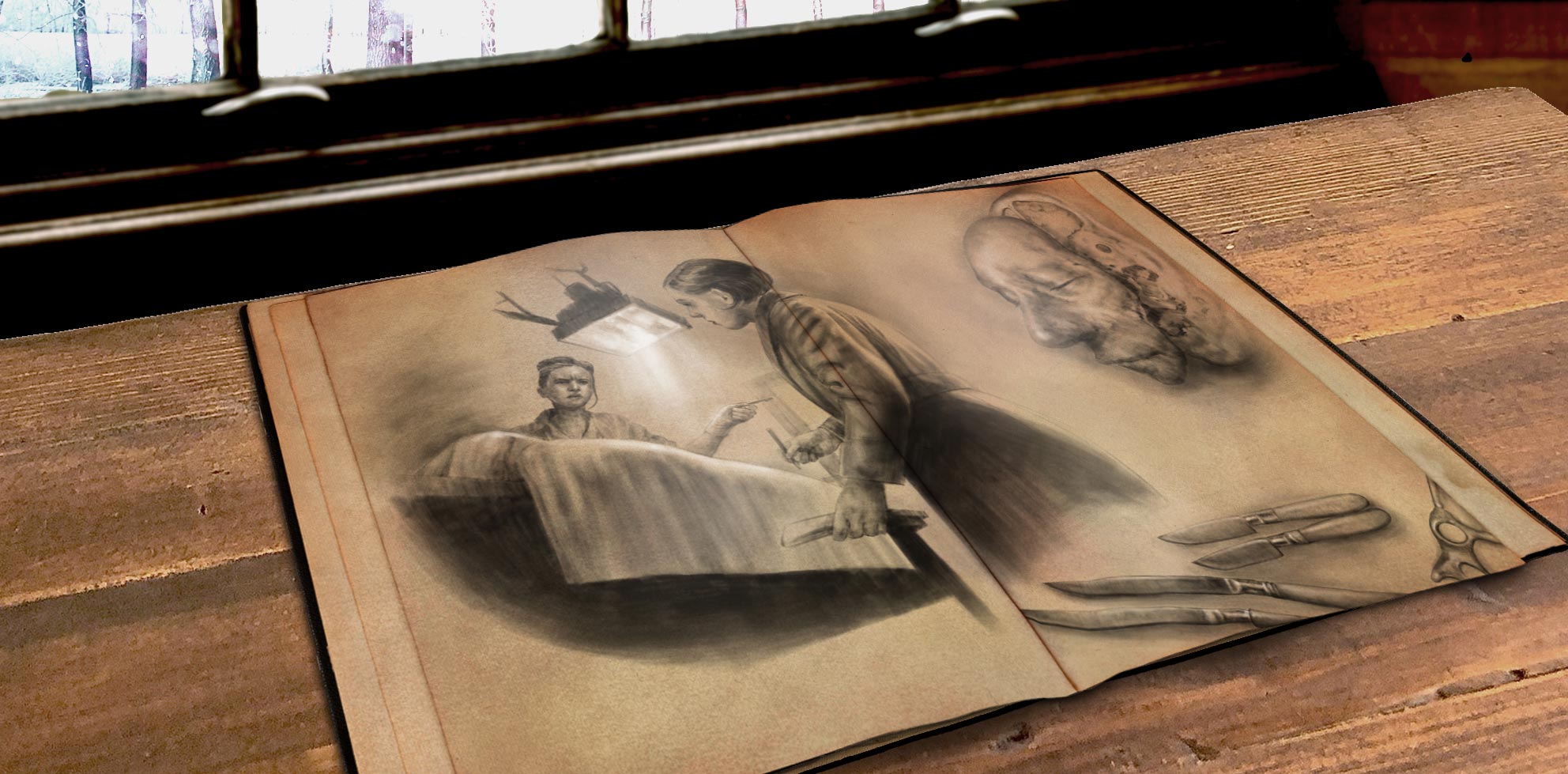
Check back next Monday for the final instalment of Grave Rumors.
Arkham Horror – The Roleplaying Game Starter Set – Hungering Abyss will be out on August 2, 2024.
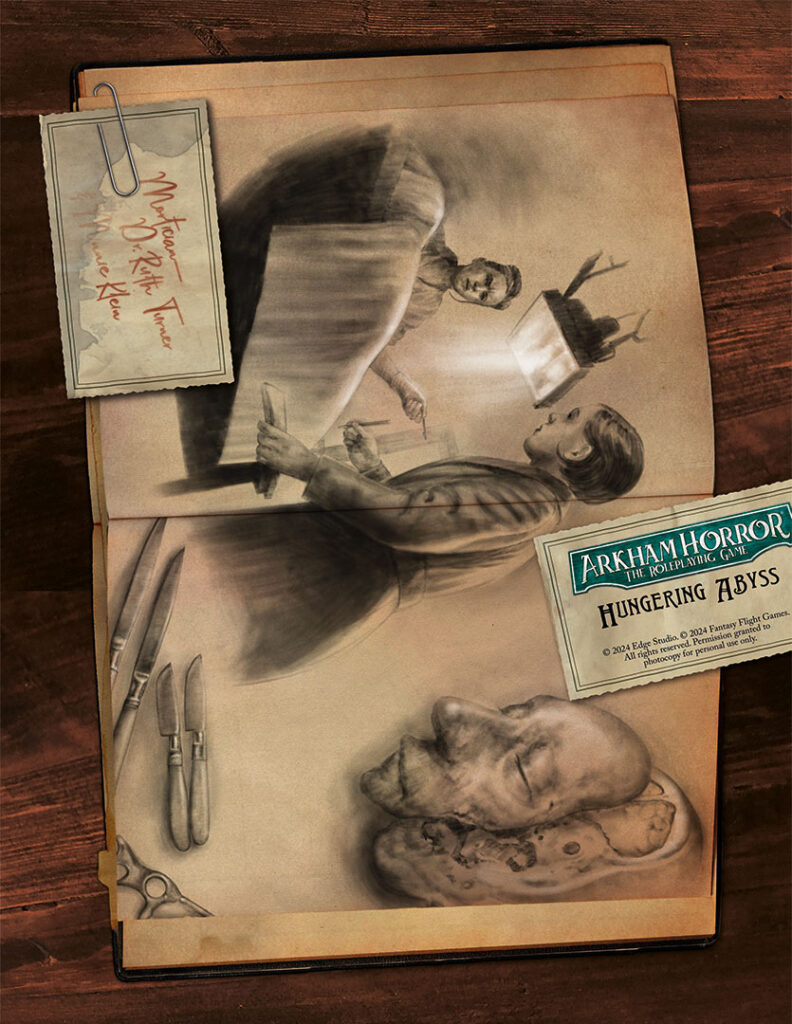
You can get a sketch and newspaper of this part of the story here

